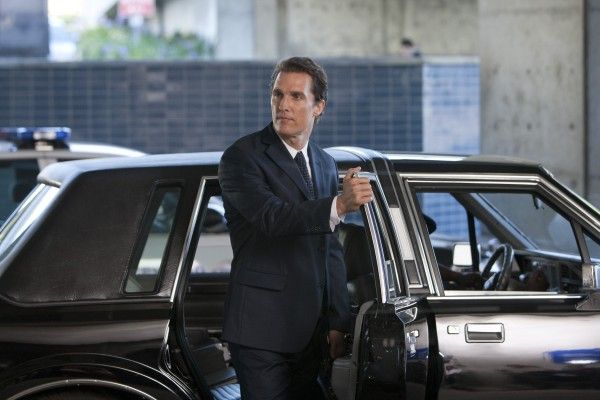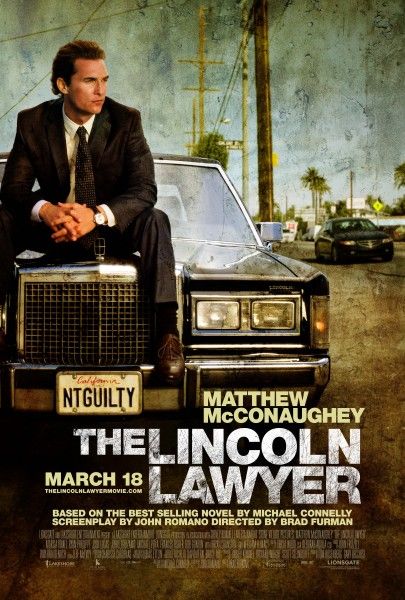In the new thriller The Lincoln Lawyer, based on the best-selling novel by Michael Connelly, charismatic defense attorney Mick Haller (Matthew McConaughey) unexpectedly lands the case of a lifetime, defending rich Beverly Hills playboy Louis Roulet (Ryan Phillippe). Charged with attempted rape and murder, Roulet deceivingly leads Haller to believe the case will be quick, landing him some easy money. But, when the case goes to trial, the streetwise lawyer who works out of the backseat of a chauffeured Lincoln Continental, finds out that this may not be the only crime Roulet is responsible for.
At the film’s press day, actor Matthew McConaughey talked about his attraction to playing lawyers, the fact that he thought he was going to be a lawyer when he was a teenager, the ways in which he identified with Mick Haller, the importance of music as a tool to help him find his character, and his preference to keep things moving on a set. Check out what he had to say after the jump:
Question: Why do you like playing lawyers so much?
MATTHEW McCONAUGHEY: I thought that’s what I wanted to with my life, since I was 14. When I was in school, that’s where I thought I was heading – law school at the University of Texas. I changed my mind my junior year, when I looked up and saw two more years of school, then four years of law school. I thought, “You’ll be 28 by the time you get out and you can actually implement an imprint in society.” I didn’t like that idea. I didn’t want to miss my 20's. I wanted to get experience and try something out.
What was it that you liked about law?
McCONAUGHEY: The debate. I love debate, from both sides. When I was 19, 20, 21, I really started to fall on the side of the defense and really felt like that I was purely built for it, and felt 100% clear with being able to defend someone, if I knew they were innocent. That was a battle that I could not lose. There are certain things that you believe in and go, “That’s one of those places that I’ll find every bit of energy from the depths of my body and ancestry to fight, and win that fight.” That was idealistically why I was interested in defense and criminal law.
Now, I’m glad that I changed my path. I get to do this, and then go on to another story. With this story, it’s much more of a pragmatic character, as far as knowing how the system works. That ideology that I had at 19 and 20, this character doesn’t have that. He knows how the system works. The thing is that most of these defense attorneys are defending people who are guilty, and they know that. It’s just to what degree, and how much you can ameliorate the sentence and bring it down. The system is much more of a game. It’s much more, “Let’s make a deal, out here in the alley outside of court, so we can go in and get this off our desk,” than I ever thought it was. This guy plays the game very well and knows the system. He’s on the side of defending the people that can’t defend themselves – that underbelly of society. His challenge is to make the system work for him while not letting the system know they’re working for him.
Did you have the opportunity to meet any attorneys who are like your character?
McCONAUGHEY: Yeah, I spent some time with a few. I got a lot of information from a couple, in particular. I went in thinking that I was going to get something really specific, but it became more about watching them work and watching the movement. It was never anything specific. It was almost like they were bookies. They’re wheeling and dealing, haggling back and forth. They love telling their story. They love talking. They’re born performers. They want to get up there and perform. They revel in that. Some of them had some high-profile cases, and those high-profile cases were on the wall, showing you, “Yes, that was me.” They weren’t heavy in the morality of the situation. It’s not that. It was much more that they have a job to do, and this is the job. The job is to get you a not guilty, or lessen your sentence.
Mick Haller has a rhythm to him that carries the film. Was that in the script?
McCONAUGHEY: I personally love movement, anyway. This whole script had movement, in its simplest form, for the mobile office. The Lincoln had such great entrances and exits from scenes. Open up, the Lincoln pulls in, he gets out. It’s a great segue-way. It’s literally a vehicle for segue-ways. That was something true about these guys who do what he does. They don’t stop. Everything is moving, like a dance. They’ve always got a few things going. They have a dexterity that is always on the move.
Are you like that, too?
McCONAUGHEY: I prefer it. I’d rather work that way when we’re making films, too. I can’t going back to my trailer to wait, to then re-enter the next scene. Let’s show up on set that day and everyone be prepared, and let’s crank and shoot film all day. Let’s rehearse it on film.
Did you have a soundtrack for this character?
McCONAUGHEY: Yeah. Music is a really great creative tool for me, for different roles. The soundtrack for Mick Haller was much different than any other soundtrack I’ve had, for any other character. That’s always fun to go through. Brad Furman, the director, had a really good musical sense of where he wanted to go with the film. Early on, I said to him, “One of the best things you can do for me is let me have, musically, what you’ve got.” So, he handed me 40 songs, 30 of which I didn’t know. That helped with the movement, the pace and the approach.
When it comes to that go-go attitude, how is that when you’re doing multiple takes on a film?
McCONAUGHEY: We didn’t do many scenes over and over. I think we averaged four or five. I just finished working with William Friedkin (for Killer Joe), who always does a maximum of two, and I like that. I like when there isn’t time to warm up into it because, if you didn’t get it by take two, that’s too bad. Then, you show up more on the first take, for sure. I don’t mind more takes because I have a really good amount of energy and don’t mind if we try something a little different. It’s nice to do it again, sometimes, if I catch myself acting.
Did you and Ryan Phillippe intentionally decide not to rehearse together?
McCONAUGHEY: I’ve done films where we don’t rehearse and I’ve done films where we heavily rehearse. I like rehearsals. Just for this particular relationship that my character, Mick, has with Roulet (Phillippe), my client. We’re both trying to play each other, throughout the movie. I didn’t want to know. I didn’t even want to have an idea of what his hand was going to be, and I sure as hell didn’t want to share with him what my hand would be. I was like, “Let’s meet when we’re in the scene. Let’s meet each other there and go on this two-month, fun journey of getting to know each other through our characters.”


